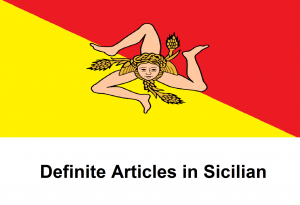Difference between revisions of "Language/Sicilian/Grammar/Definite-Articles-in-Sicilian"
Jump to navigation
Jump to search
| Line 10: | Line 10: | ||
__TOC__ | __TOC__ | ||
==Articles in Italian & Sicilian== | ==Definite Articles in Italian & Sicilian== | ||
The Italian definite articles '''il, lo''' have a single Sicilian equivalent, '''lu'''. | The Italian definite articles '''il, lo''' have a single Sicilian equivalent, '''lu'''. | ||
| Line 25: | Line 20: | ||
Before a vowel. In most dialects of Sicilian, the plural article is elided in the same way as the singular. | Before a vowel. In most dialects of Sicilian, the plural article is elided in the same way as the singular. | ||
==Definite articles in Sicilian: Examples== | ==Definite articles in Sicilian: Examples== | ||
Revision as of 12:20, 19 November 2022
Hello everyone,
In today's lesson you will learn how to use the articles in Sicilian.
Happy learning ! :)
Definite Articles in Italian & Sicilian
The Italian definite articles il, lo have a single Sicilian equivalent, lu.
Article la is identical in both languages. Italian includes several different plural articles: i, gli for masculine nouns, le for feminine ones.
In Sicilian there is only one plural article, li. In both languages the singular definite article is reduced to l'.
Before a vowel. In most dialects of Sicilian, the plural article is elided in the same way as the singular.
Definite articles in Sicilian: Examples
| ENGLISH | SICILIAN |
|---|---|
| The horse | Lu cavaddu |
| The dog | Lu cani |
| The bird | L`aceddu |
| The doctor | Lu medicu |
| The house | La casa |
| The city | La cità |
| The window | La finestra |
| The mouth | La vucca |
| The horses | Li cavaddi |
| The dogs | Li cani |
| The birds | L` aceddi |
| The doctors | Li medici |
| The houses | Li casi |
| The cities | Li cità |
| The windows | Li finestri |
| The mouths | Li vucchi |
